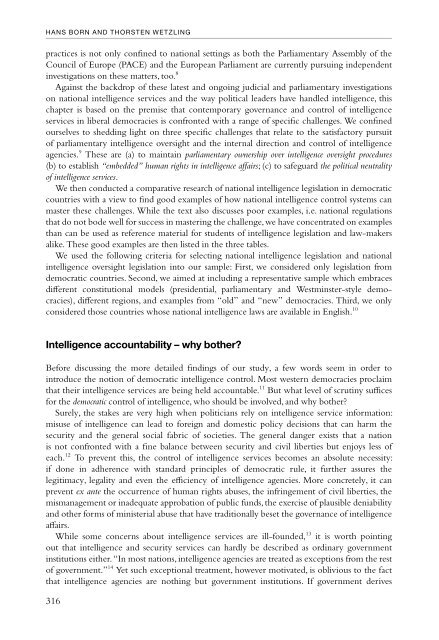Handbook of intelligence studies / edited by
Handbook of intelligence studies / edited by
Handbook of intelligence studies / edited by
You also want an ePaper? Increase the reach of your titles
YUMPU automatically turns print PDFs into web optimized ePapers that Google loves.
HANS BORN AND THORSTEN WETZLING<br />
practices is not only confined to national settings as both the Parliamentary Assembly <strong>of</strong> the<br />
Council <strong>of</strong> Europe (PACE) and the European Parliament are currently pursuing independent<br />
investigations on these matters, too. 8<br />
Against the backdrop <strong>of</strong> these latest and ongoing judicial and parliamentary investigations<br />
on national <strong>intelligence</strong> services and the way political leaders have handled <strong>intelligence</strong>, this<br />
chapter is based on the premise that contemporary governance and control <strong>of</strong> <strong>intelligence</strong><br />
services in liberal democracies is confronted with a range <strong>of</strong> specific challenges. We confined<br />
ourselves to shedding light on three specific challenges that relate to the satisfactory pursuit<br />
<strong>of</strong> parliamentary <strong>intelligence</strong> oversight and the internal direction and control <strong>of</strong> <strong>intelligence</strong><br />
agencies. 9 These are (a) to maintain parliamentary ownership over <strong>intelligence</strong> oversight procedures<br />
(b) to establish “embedded” human rights in <strong>intelligence</strong> affairs; (c) to safeguard the political neutrality<br />
<strong>of</strong> <strong>intelligence</strong> services.<br />
We then conducted a comparative research <strong>of</strong> national <strong>intelligence</strong> legislation in democratic<br />
countries with a view to find good examples <strong>of</strong> how national <strong>intelligence</strong> control systems can<br />
master these challenges. While the text also discusses poor examples, i.e. national regulations<br />
that do not bode well for success in mastering the challenge, we have concentrated on examples<br />
than can be used as reference material for students <strong>of</strong> <strong>intelligence</strong> legislation and law-makers<br />
alike. These good examples are then listed in the three tables.<br />
We used the following criteria for selecting national <strong>intelligence</strong> legislation and national<br />
<strong>intelligence</strong> oversight legislation into our sample: First, we considered only legislation from<br />
democratic countries. Second, we aimed at including a representative sample which embraces<br />
different constitutional models (presidential, parliamentary and Westminster-style democracies),<br />
different regions, and examples from “old” and “new” democracies. Third, we only<br />
considered those countries whose national <strong>intelligence</strong> laws are available in English. 10<br />
Intelligence accountability – why bother?<br />
Before discussing the more detailed findings <strong>of</strong> our study, a few words seem in order to<br />
introduce the notion <strong>of</strong> democratic <strong>intelligence</strong> control. Most western democracies proclaim<br />
that their <strong>intelligence</strong> services are being held accountable. 11 But what level <strong>of</strong> scrutiny suffices<br />
for the democratic control <strong>of</strong> <strong>intelligence</strong>, who should be involved, and why bother?<br />
Surely, the stakes are very high when politicians rely on <strong>intelligence</strong> service information:<br />
misuse <strong>of</strong> <strong>intelligence</strong> can lead to foreign and domestic policy decisions that can harm the<br />
security and the general social fabric <strong>of</strong> societies. The general danger exists that a nation<br />
is not confronted with a fine balance between security and civil liberties but enjoys less <strong>of</strong><br />
each. 12 To prevent this, the control <strong>of</strong> <strong>intelligence</strong> services becomes an absolute necessity:<br />
if done in adherence with standard principles <strong>of</strong> democratic rule, it further assures the<br />
legitimacy, legality and even the efficiency <strong>of</strong> <strong>intelligence</strong> agencies. More concretely, it can<br />
prevent ex ante the occurrence <strong>of</strong> human rights abuses, the infringement <strong>of</strong> civil liberties, the<br />
mismanagement or inadequate approbation <strong>of</strong> public funds, the exercise <strong>of</strong> plausible deniability<br />
and other forms <strong>of</strong> ministerial abuse that have traditionally beset the governance <strong>of</strong> <strong>intelligence</strong><br />
affairs.<br />
While some concerns about <strong>intelligence</strong> services are ill-founded, 13 it is worth pointing<br />
out that <strong>intelligence</strong> and security services can hardly be described as ordinary government<br />
institutions either. “In most nations, <strong>intelligence</strong> agencies are treated as exceptions from the rest<br />
<strong>of</strong> government.” 14 Yet such exceptional treatment, however motivated, is oblivious to the fact<br />
that <strong>intelligence</strong> agencies are nothing but government institutions. If government derives<br />
316
















